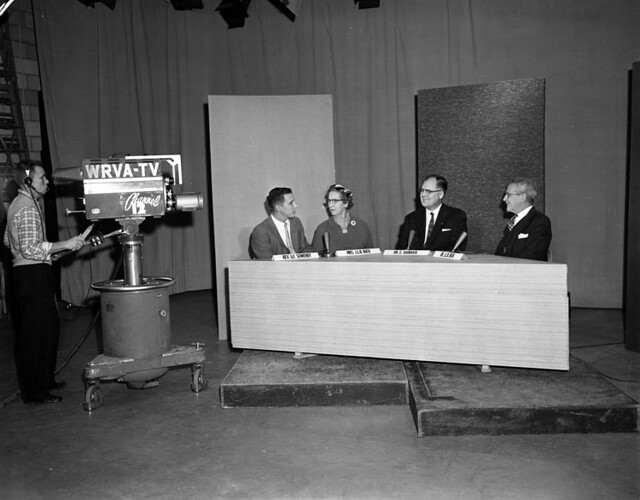
Richmond Council of Churches, WRVA-TV from The Library of Virginia
For most of the 20th century doctors in the UK were urged to stay anonymous when speaking in public. The big fear was that doctors would use publicity to advertise themselves; to suggest that they were better than other doctors.
Here follows an extract from the BMJ in 1962 called "The Doctor's Code". It is written by Sir David Campbell a past president of the GMC (General Medical Council).
"The other example is advertising, whether directly or indirectly, by canvassing or touting for patients or by causing articles to appear in the press drawing the attention of the public to the superior skill of the advertiser. If such practices were permitted, it would cut at the root of all decent relationships between members of the profession, and the public might be grossly misled. For there would be no guarantee of the superior merit of the doctor with the fewest scruples in praising himself and his methods. "So that is why doctors were urged to stay anonymous. The BMA had it as part of their code of coduct until the 1980s. It was regularly debated at the Annual Representative Meeting. By 1984 the leadership of the BMA was perhaps out of step with the voting membership as this report in the BMJ states.
"T
he representative bodywanted anonymity "preserved in all cases, except where apractitioner is acting as the official spokesman of a healthauthority or professional body, or where the public interestclearly demands the naming of the practitioner.I had been mildly surprised at Manchester that the representative body had supported this motion: it had a Canute-like ring. Most committee members were of the same mind, for they saw little wrong with a doctor being identified in the media."
But the BMA resolutions were not enough for some. They wanted the GMC to come out and take a stand on anonymity and the doctors who they perceived as breaking it. A letter to the BMJ in 1968 from Athur Wigfield states:
"Let's go back to the ex-GMC president, Sir David Campbell. This is another extract from his piece the Doctor's Code where he explains that although some call for the GMC to make pronouncements on what are acceptable standards of behaviour in the light of new media, they can not.
Pious resolutions on the subject by theB.M.A. are patently ineffective. The mainpurpose of this letter is to ask if we may ever expect the General Medical Council, some ofwhose members may be presumed to read the papers, to deliberate or act. Medical ethics are surely not limited to sober driving and impeccable conduct in the presence of patients. They extend to the steps of the hospital. In the interests of all of us someone should remind others of us that it is better to earn lifelong respect and adulation of colleagues than achieve ephemeral notoriety in the eyes of a sensation-lapping and morbidly curious public."
"And here I would like to say something with regard to a criticism which has sometimes been levelled at the Council and indeed at the President. It is said that while the carefully worded notice tells practitioners in broad outline what they should not do, the Council has not seen fit to define in a positive sense what the practitioner might do. It is alleged that the Council is strangely mute or evasive when it is pressed for a pronouncement on, for example, any adjustment of conduct which might be permitted in the light of modern facilities for the health education of the public through the medium of the press or the radio or television. And it is averred that practitioners doubtful about their position in these matters receive little help of a practical nature if they address direct questions to the President or to the Council. Any hesitation to express an opinion or reticence on the part of the Council or the President is due to their statutory position. They are the judges of professional conduct in the last resort and are bound to judge every case that comes before them on the facts of the case as presented in evidence. Neither the Council, therefore, nor its President, who in fact has to deal with correspondence of this nature, can possibly commit the Council in advance to a specific view on any question which is not covered by decided cases. I may add that the Council while indicating the desirability of anonymity in broadcasting has not attempted to prevent the publication in the press of articles on medical subjects or broadcasting by registered medical practitioners. It rests, however, with practitioners who contribute such articles or take part in such activities to exercise their discretion so as not to afford ground for complaint to the Council."So half a century ago new media was causing a bit of a furore. The GMC was cautious about taking a stand. Fast forward to 2013 and the GMC issues guidance that doctors should shun anonymity in social media. They have stepped in to territory that they sought to avoid 50 years ago and this is the result.
It's curious how things that are taken for granted as unassailable at one point in time - that medical ethics is mostly about medical anonymity in this case - can seem so totally misguided and misplaced at another.
ReplyDeleteIt makes you wonder what we are not questioning now that future generations will wonder at.
I'm not so sure we have moved away from this belief. As Margaret McCartney has said, conflict of interest may be a bigger issue that pseudonymity.
DeleteThere I was thinking that Donald Campbell was a land and water speed record breaker. A brief look at Wikipedia doesn't immediately come up with his position of past president of the GMC.
ReplyDeleteAnd I made the mistake not once but TWICE!!
Delete